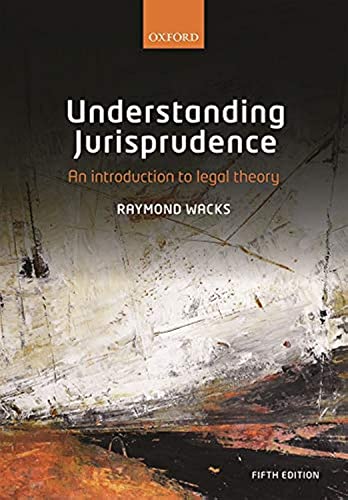Understanding Jurisprudence
An Introduction to Legal Theory
Raymond Wacks
BOOK REVIEW

Diving into Understanding Jurisprudence: An Introduction to Legal Theory by Raymond Wacks is like stepping into a vibrant kaleidoscope of legal thought, where every chapter spins a new thread in the intricate fabric of justice and philosophy. This book isn't merely an academic tome; it's a lifeline flung to those swimming through the deep waters of legal theory, where concepts clash and intertwine, leaving indelible marks on the very structure of society.
Wacks, an esteemed scholar in the realm of law, embodies the intellectual vigor that addresses the core mechanisms through which law interacts with human existence. Each page is a portal that compels you to grapple with questions that are not just academic but profoundly existential. What is justice? How does law reflect our values? Can we separate morality from legality? The questions unfurl like a dramatic play, each posing a challenge that invites not just contemplation but vigorous debate.
Readers have noted the book's ability to strike a balance between accessibility and depth. Many laud it as essential reading for both students and seasoned practitioners seeking to refresh their intellectual toolkit. But don't let the approachable prose fool you-Wacks confronts dense theories with a clarity that both enlightens and provokes. Critics sometimes argue that certain sections lack the rigorous detail found in more specialized texts, but perhaps this is a strength rather than a flaw; the aim here is to illuminate, not to obscure.
Throughout its pages, Wacks weaves historical context, philosophical inquiry, and practical implication. His discussions are punctuated with illustrative examples that ground complex theories in real-world scenarios. Take, for instance, his exploration of legal positivism versus natural law. He doesn't just lay out the arguments; he crafts a narrative that resonates with everyday moral dilemmas, making the abstract tangible. Readers cannot help but feel the weight of real-life consequences shaped by these theories.
The book isn't merely a solitary journey; it echoes the voices of historical giants-H.L.A. Hart, Ronald Dworkin, and John Rawls-each contributing to the legal discourse that influences current practices and ideologies. By drawing connections between these thinkers and contemporary issues, Wacks fosters a dialogue that transcends time, forcing us to reckon with the legacies and limitations of their ideas.
Wacks' unique perspective encourages readers to embark on a journey-one that is fraught with challenges, yet undeniably rewarding. It's as though he beckons you into a labyrinth of legal thought, where each turn offers new insights and the potential for intellectual growth. The emotional high points are intoxicating; the moments of realization can strike with the force of a thunderclap.
This book isn't simply a guide through legal theory; it's a mirror reflecting the very essence of our civilization's pursuit of justice. In our current landscape, where calls for reform and accountability resonate louder than ever, Wacks' work emerges as a crucial compass, urging us to revisit foundational concepts and consider their implications for justice today.
FOMO (Fear of Missing Out) envelops the reader-what if you remain oblivious to these powerful discussions? What if you let these insights slip through your fingers? The allure is palpable, and the urgency grows with each page turned. Vivid anecdotes and philosophical musings collide, leaving you with a potent mix of exhilaration and introspection.
Critics and thinkers have emphasized that Wacks' work has inspired not just students but seasoned legal professionals and even activists who seek a deeper understanding of the law's role in society. Influencers in pacifist movements and reformers have cited his clear articulation of legal theories as pivotal in shaping their strategies and understanding of justice.
In Understanding Jurisprudence, Raymond Wacks has crafted more than just a textbook; he has penned an invitation to engage with some of the most profound inquiries of our time. Enigmatic and compelling, this book urges each of us to reflect on our role within the grand narrative of jurisprudence. The predominant themes of justice, equality, and morality resonate, compelling you to not only think but feel deeply about the world around you. 📚
Prepare to be captivated, to be unsettled, and ultimately, to be transformed by the profound explorations within these pages. Wacks does not shy away from complexity; rather, he embraces it, illuminating the shadows that obscure our understanding of law and society. Your journey through legal theory is waiting-dare to take the plunge!
📖 Understanding Jurisprudence: An Introduction to Legal Theory
✍ by Raymond Wacks
🧾 432 pages
2017
#understanding #jurisprudence #introduction #legal #theory #raymond #wacks #RaymondWacks